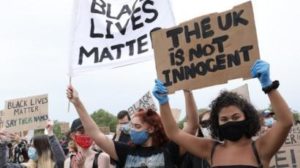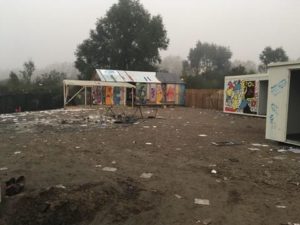Ending Racism is Everyone’s Business: Racism in the UK – Your Own House is Burning
As part of our commitment that Ending Racism is Everyone’s Business we’ll be sharing voices from the movement. Today, Eden Samuels-Coke makes clear that we must get our house in order.
Robin Keat had a long, successful career with West Yorkshire Police, spanning three decades. He also had a daughter. At least, that was until he disowned her for being in a relationship with a black man. When he eventually returned to his daughter’s life 17 years later, sharing that he had a congenital heart condition that would eventually kill him, he made it clear he only intended to see his daughter and not, he stressed, his mixed race grandchildren.
I am one of those grandchildren, and across my entire life people have been telling me that this country does not have a racism problem.

Black Lives Matter
The recent tragic death of George Floyd has generated worldwide outrage and horror at the brutality and ugliness of racism in America. Yet, the racism that killed him and has you clutching your pearls right now is not a distant ill that lies on the other side of the Atlantic. It has always been here in the UK, and remains largely ignored and often denied. This is one aspect of why, for so many black people in the UK, recent events both hurt and are deeply personal.
You need only search the names of Sarah Reed, Jimmy Mubenga, Sean Rigg, Olaseni Lewis and Azelle Rodney for saddening examples of the brutalising of black bodies here in the UK and, sadly, there are so many more. You might think my grandfather could have been a one-off, but recent data revealed that West Yorkshire Police are nearly three times more likely to use force against black people, and nearly four times more likely to use tasers against us.
There have been numerous statistics shared lately that convey the stark reality of racism in this country across policing, mental health services, the judicial system and all spheres of society.
However, what I would like to share with you today are a couple examples of racism that statistics find harder to capture.
Racism is Cradle to Grave
Racism is not something that just manifests in our lives for that one capturable incident in which someone shouts “nigger” from a passing car, and then is gone again until the next time an incident occurs. Racism affects us systemically and otherwise, from before we are even born (with black women being more likely to die during pregnancy and childbirth), to the day we die.
People sometimes understand that racism affects how the world thinks about and acts towards us, but sometimes it affects how we think of ourselves and how we act too.
I remember as a small child, having experienced so much racism and othering that I was not sure I would be able to fulfil my dreams of simultaneously being an astronaut, palaeontologist and ice cream man, simply because I genuinely wasn’t certain I was equal to my white counterparts.
I remember growing into a teen and beginning to notice that, sometimes, others would perceive me differently — often with suspicion or as a threat. I remember the times that shop security guards would follow me and the times people crossed to the other side of the road, among countless other examples. I remember when I stopped wearing my favourite black tracksuit — optimistically thinking that, if I dressed differently, these things might not happen anymore.
I remember the near 1,500 children in the Calais refugee camp — children left there for a week after its demolition. I was there. I remember the children that cried wondering why the UK did not want them. I remember the sheer neglect of the UK and French governments to protect those children. The message was loud and clear: their young Black and Asian lives did not matter.

The remains of the Youth Centre at the Calais camp
A Gaslighting Society
There are so many more examples: the explicit racial abuse, the systemic racism, the lifetime’s worth of othering and micro-aggressions, and the dozens of other ways we experience racism as black people.
We see the shameless manifestations of disregard for black lives that are the Windrush scandal and Grenfell.
We keep experiencing these things, and people are still telling us that this country does not have a racism problem. Better yet, they tell us that we should be grateful to be here as “other countries are more racist”. In this sense, to live as a black person in this country is to exist in an abusive relationship with the society you live in. It’s to experience first the trauma of racism, and then the disregard and outright denial of your experiences and pain.
Enough is Enough
I hope you understand why the black community here is upset and angry. The stories shared above are just a couple of mine, but I promise you in this country there are millions more and counting. I don’t know how many of you will be joining the Black Lives Matter protests in the coming weeks, but I will be — upset, angry, and back in my black tracksuit.
By Eden Samuels-Coke. For our statement on the Black Lives Matter movement and our commitment to ending racism, see here.
This blog originally appeared on Artful Sonder.
